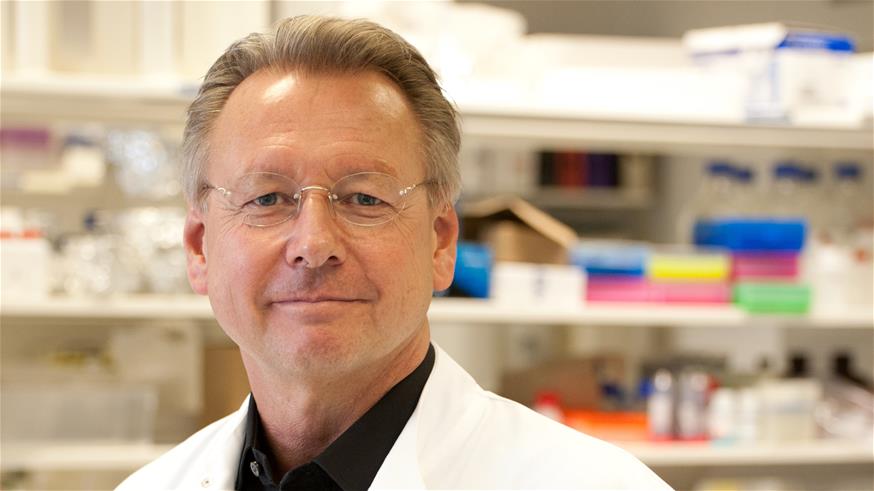
Professor Paul Workman, ICR Chief Executive, will lead a session about career development on the first day of the 2017 AACR conference in Washington D.C.
On the eve of this year’s American Association of Cancer Research (AACR) conference, I caught up with ICR Chief Executive Professor Paul Workman to ask about the advice he would give to cancer researchers starting out in their careers.
A central theme from his replies was that in modern cancer research you can’t succeed just on your own – you also need networks and mentors, and you’ll often have greater impact and find huge reward if you combine your efforts with those of others.
ES: What motivated you to pursue a career in cancer research?
PW: I started my PhD in cancer research because I was intensely fascinated with the chemical machinery and signal switches that regulate our cells, and particularly how they control cell function and division. And I was equally curious about how, when this biochemical signalling goes wrong, this leads to disease.
I became quite obsessed early on about how we can discover new medicines to control and cure disease. It seemed extraordinary to me when I was starting out – and it still does today – that we could alter the cell’s faulty switches with drugs in a very specific way and have a huge impact on human life. So my passion is based heavily on the dual attraction of scientific curiosity and a desire to cure disease – especially cancer which took both of my parents.
ES: What have you found has supported your career development?
PW: Over my career I’ve been lucky enough to work with many inspiring lab researchers and clinical scientists who have acted as supportive mentors and colleagues. And there’s no doubt that moving between academia and industry has been particularly useful in terms of experiencing different working cultures and way of tackling problems.
After my initial years in academia at Leeds, Cambridge, Stanford and Glasgow, I spent four years leading cancer drug discovery at AstraZeneca – and this pharma period was extremely helpful in understanding how to build, lead and motivate large trans-disciplinary teams. Together with my academic experience this was invaluable when it came to moving to the ICR 20 years ago. There is a wealth of expertise in team science in industry that we need to capture and learn from in academia.
I’ve also been a founder of two spin-out biotech companies which has given me additional experience and insights as well. And as a translational scientist, working very closely with both basic researchers and clinicians has been fantastic.
ES: What is your advice for someone in the early stages of a career in cancer research?
PW: Individual excellence and personal expertise in a discipline remain really important. But we are seeing substantial shifts in the way science operates with profound consequences for scientists’ careers. Modern science is a team game – an intensively collaborative, creative processes that draws together many people, each bringing different experiences and expertise. Increasingly, success is defined by those who can successfully pool their ideas, resources and expertise. I have always found it hugely stimulating and rewarding to work across disciplines – and there is no doubt that I have achieved more and had more impact because of that.
In my case, I work at the interface of biology and chemistry to discover new drugs. And at the interface between pharmacology and clinical research to translate discoveries for patient benefit. I’m now also excited about interfacing cancer research with big data and engineering, as we’ll be doing in the new Cancer Research Centre of Excellence we have established between ICR and Imperial College.
The boundaries of collaboration now stretch far beyond the walls of your own laboratory or institute as you will increasingly work with colleagues across the globe. It really is crucial to make the most of your networks, and to continue the lines of communication wherever you go to next.
Take active steps to shape your career. Find an organisation that aligns with your aims, values your contribution and has the right organisational culture. Science can sometimes feel like a lonely endeavour, requiring a huge amount of effort, concentration and commitment – so it’s really important to have mentors, role models, colleagues and collaborators who will support you through this.
Take opportunities you are offered for training and leadership development, including in areas like managing people in teams, communication and conflict resolution, which will all become vital for working in collaboration and in team science – where managing people outside your personal discipline expertise and direct responsibility becomes so important.
Resilience is a good skill to master too. This quote from Hilary Clinton sums it up for me: “Take criticism seriously, but not personally. If there is truth or merit in the criticism, try to learn from it. Otherwise, let it roll right off you”.
ES: What have you found most personally rewarding about your career?
PW: For me, the most rewarding experience has been working on projects where not only has the science itself been of excellent quality, but also more importantly where a drug we have discovered has progressed to the clinic and shown activity in patients. That’s my main goal – and that’s why I do what I do.
And there is also my leadership role where it’s increasingly important to develop the institution and people of the ICR – also to contribute nationally and internationally. I am championing internal programmes that create a culture where all researchers can thrive, including programmes on gender equality, distributed leadership and mentoring. We need to do everything we can to make the most of all our research talent if we’re to train the next generation of brilliant cancer researchers.
comments powered by